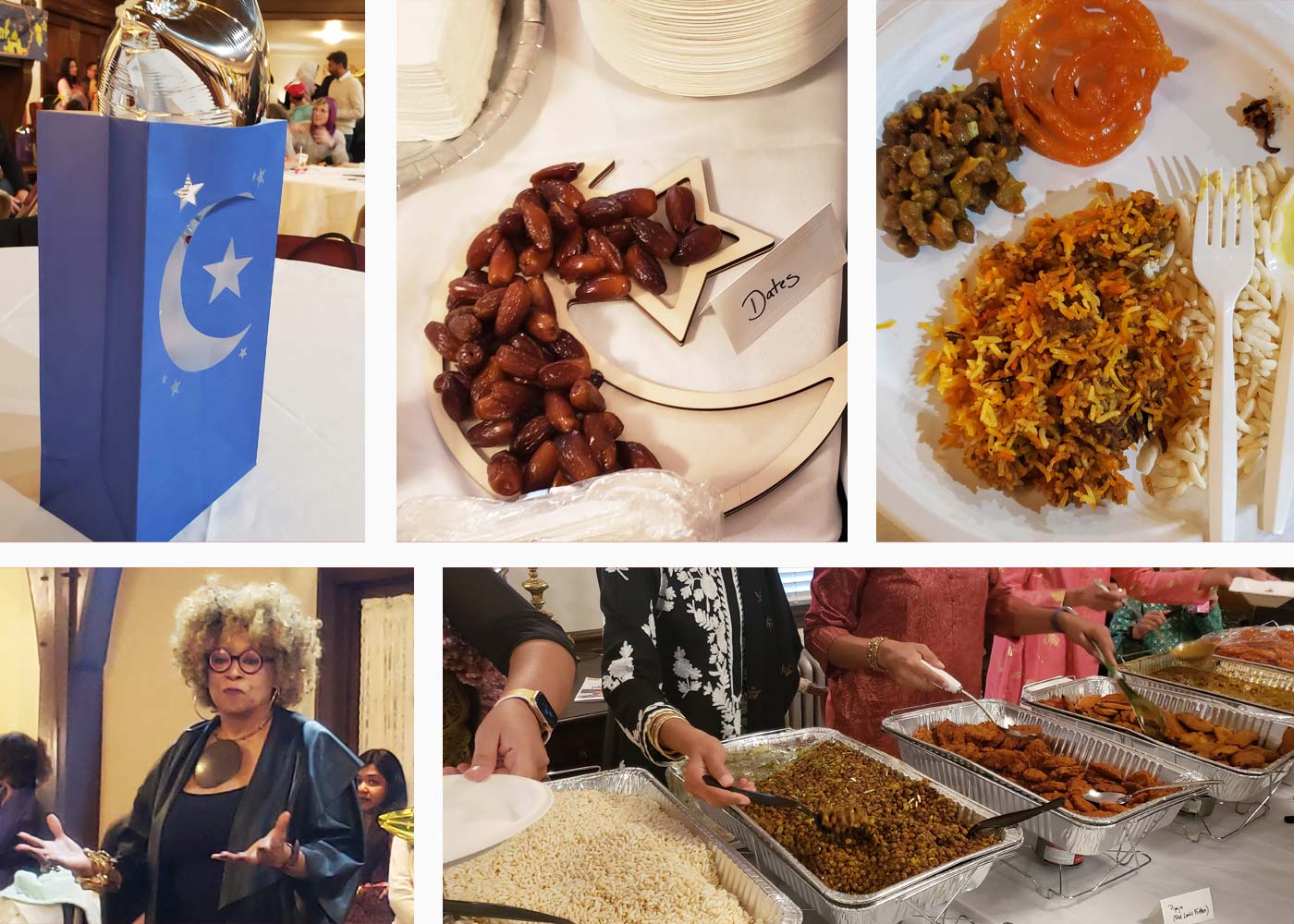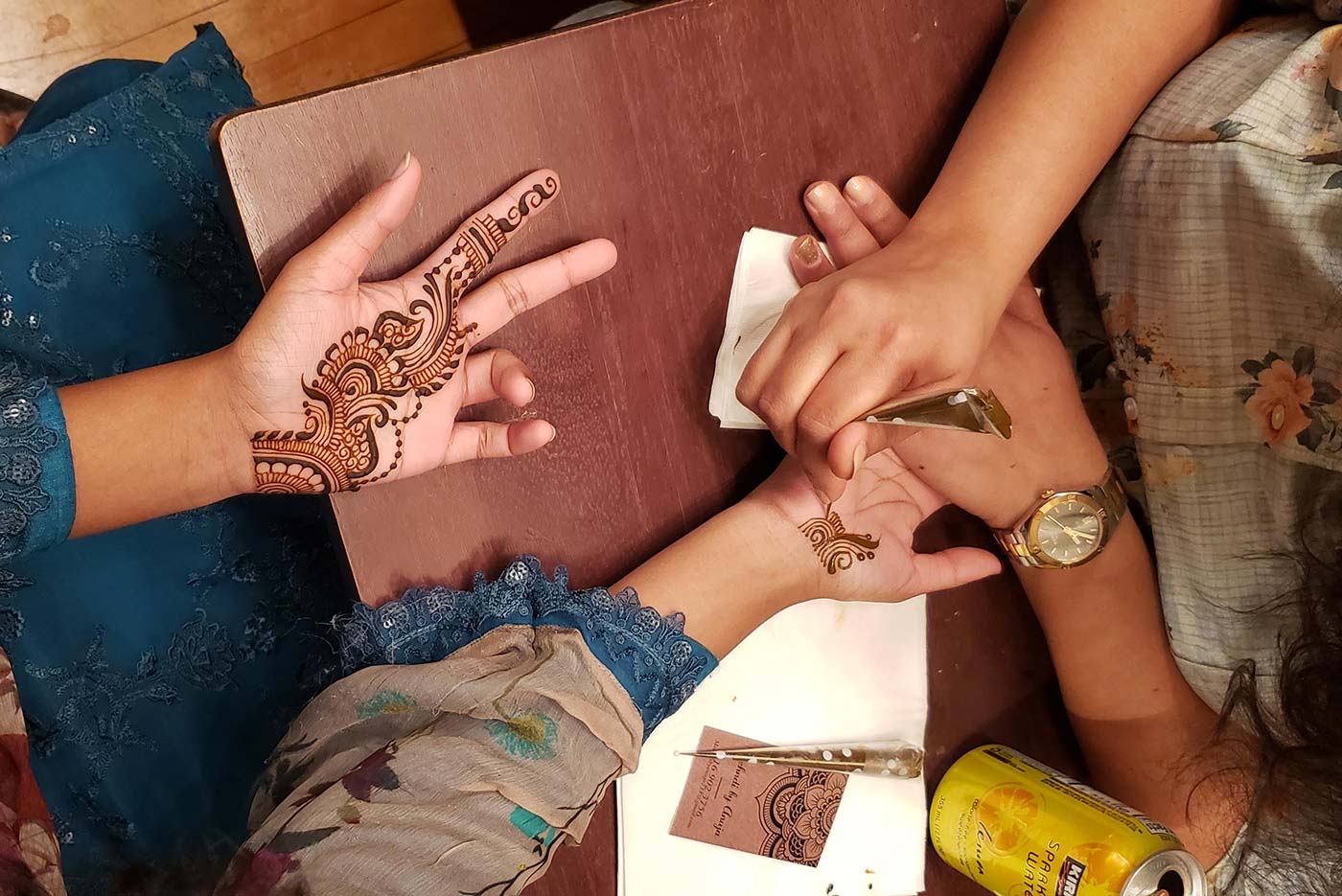The Feast After Fasting
Hues of gold and blue shone in the sunset-lit room where guests gathered in anticipation for the iftar dinner. Stars and crescent moons, symbols of Islamic values, adorned the tables in the form of Microfoil balloons, paper cutouts, and wooden trays containing red dates, the fruit that would break the Ramadan fast.
AAPI (Asian American and Pacific Islander) Montclair’s first Ramadan iftar dinner event at the Woman’s Club of Upper Montclair was about to begin.
Iftar is the meal eaten by Muslims at sunset to break their daily fast during Ramadan, explains one of the first speakers. During the month of Ramadan, Muslims are required to fast by abstaining from food, drink, and sexual relations from dawn until sunset each day.
At the end of Ramadan, the three-day celebration known as Eid al-Fitr—or the Festival of the Breaking of the Fast—is held to commemorate the month. Ramadan is auspiciously known as the month of giving and reflecting. To quote from Surah Al-Baqarah 185 in the Qur’an:
“Ramaḍân is the month in which the Qur’an was revealed as a guide for humanity with clear proofs of guidance and the standard to distinguish between right and wrong. So whoever is present this month, let them fast. But whoever is ill or on a journey, then let them fast an equal number of days after Ramaḍân. Allah intends ease for you, not hardship, so that you may complete the prescribed period and proclaim the greatness of Allah for guiding you, and perhaps you will be grateful.”
The iftar meal typically commences with dates, a tradition followed at the Montclair gathering last April. Besides being a sweet healthy appetizer to awaken the appetite, the fruit is mentioned briefly in the Qur’an as one of Prophet Muhammad’s favorites. After the dates had been enjoyed, a variety of main dishes followed, including chana boot (spiced chickpeas), piyaju (red lentil fritters), beguni (eggplant fritters), haleem (meat and lentil stew), and jalebi (sweet funnel cake). And that was just the first half of the buffet!

The recipes originated from Bangladesh, and many other regions throughout Asia and Africa. The neon-orange jalebi was particularly popular with its candy-cane-like texture, but its deceptively rock-solid appearance gave way to saccharine syrup once one sank their teeth in. The sweetness blended beautifully with the spice of other dishes, and the fruit punch provided a welcome balance to the fiery flavors of haleem, one of the dinner’s star dishes.
“Haleem tastes like a rich porridge of legumes, meat, and grains,” explains Chef Md Mahfuzur Rahman of Star Restaurant in Paterson. “Onions, spices, and aromatics give it layers of complexity and nuance. The garnishing such as ginger, cilantro, and green chili peppers provides textural interest. Haleem is a substantial meal in itself that feels healthy, nourishing, and incredibly satisfying.”
The congregational prayer was led by the muezzin, the person who proclaims the call to prayer. This was followed by remarks by State Senator Nia Gill, who emphasized the importance of celebrating such a prestigious event.
Stickers and colored paper were available for the children to make art at a table; in another corner of the room, professional mehndi artists stenciled gorgeous henna tattoo designs with floral and vine-like curlicues on guests’ palms.
Saiful Khan, host of the dinner, was tremendously impressed by the turnout for the first-time event. “It was truly heartwarming to see people from all religions and cultural backgrounds join us for our first iftar celebration in Montclair,” he says. “For me, it reinforced what a special community we have and how important it is to have organizations like AAPI lead the charge of inclusivity and awareness-building.”
Even though there were many hungry mouths to feed, this feast offered more than enough food to go around thanks to the event organizers and volunteers; in fact, guests were surprised by the plentiful dishes that awaited them after the first helping of satisfying appetizers. The day of fasting followed by the feast not only accentuated the importance of food, but also the value of sharing it with others.
Ramadan is the ninth month of the Islamic calendar; keep an eye out for iftar dinner events hosted by AAPI Montclair from March 10 to April 9 in 2024!





